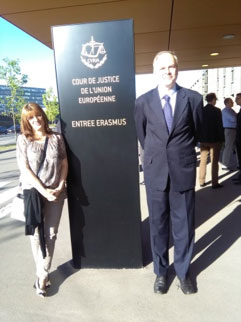 From 2nd to 7th of July 2017 two representatives from The Supreme Court of Cassation in Serbia, Advisors Ms Ana Dukić and Mr Saša Čepić attended Training in WTO AND EU TRADE LAW, organized by ERA Centre in Trier, Germany, and supported by the MDTF.
From 2nd to 7th of July 2017 two representatives from The Supreme Court of Cassation in Serbia, Advisors Ms Ana Dukić and Mr Saša Čepić attended Training in WTO AND EU TRADE LAW, organized by ERA Centre in Trier, Germany, and supported by the MDTF.
Mrs. Sybilla Fries held a lecture on key elements of WTO law, the structure of WTO agreements (Marrakesh Agreement- Annex 1, 2, 3 and 4) with an overview of substance of Annex 1 (basic obligations, basic rights, types of measures covered and policy space). The basic obligation is principle of non-discrimination consisting of two other principles (most favored national treatment (MFN) and national treatment). MFN means that you cannot favor one trading partner over another, and each trading partner gets the best treatment accorded to any other partner (including non WTO Members).The participants were presented MFN obligations for goods, MFN for trade in services, and no MFN obligation for services. Next session was about WTO law and States’ regulatory autonomy in non-trade policy matters and the WTO dispute settlement (DS) mechanism. Origin of this DS is in GATT 1947. Basic characteristics are: integrated system of a quasi-judicial nature, quasi-automaticity, compulsory jurisdiction, exclusive jurisdiction, detailed procedure and deadlines, panel and appellate review.
On the session about trade defense instruments (TDI) in the EU legislation, concrete application and key issues, results and ongoing reform, modernization of TDI and the main TDI anti-dumping and anti-subsidy investigations, the participants were explained about the meaning of “dumping” and existence of dumping (a product is considered to have been dumped if its export price to the EU is less than the normal value of the like product), determination of dumping values (dumping-constructed value, dumping –export price, dumping –fair comparison, impact of subsidies on world trade, types of subsidies, prohibited subsidies, actionable subsidies, and degrees of injury: actual material injury, threat of material injury, and material retardation of the establishment of an industry. This session was presented by Renato Antonini and Eva Monard.
The participants visited The Court of Justice of The European Union where they had briefing on a pending case (Schlom) and hearing of a pending case (Lis pendens between Swiss arbitration and German court). They had a presentation by Mr. Luca Prete about the relationship between EU and WTO law.
Michael Lux, Jikke Biermasz and Yves Melin held a session about key customs issues, The Union Customs Code (UCC), EU customs law in its EU and international context, customs decisions, rights of the defense, classification, origin, valuation. The purpose of the EU’s custom system is implementation of the EU’s common market (no duty is levied when goods cross the borders between two member states, the rules must be the same for goods crossing the external border to avoid distortions and forum shopping) and compliance with international rules (WTO, bilateral agreements) aimed at promoting free trade and the elimination or reduction of duties, making it possible to pursue the objectives of the customs systems, including the levying of duties.
Paulette Vander Schueren and Dylan Geraets held presentation about EU’s trade agreement and EU agreements like: Partnership and Cooperation Agreements (PCAs) mainly with former Soviet countries such as Kazakhstan, Russia; Stabilization and Association Agreements (SAAs) mainly with Balkan countries, such as FYR Macedonia and Albania; Euro-Mediterranean Association Agreements (EMAA); Association Agreements with neighboring countries on their way to integrate the EU single market, i.e. Ukraine, Georgia, Moldova; Economic Partnership Agreements (EPAs),etc. In addressing the needs of today’s global value chain, the European Commission’s document “Trade for all” of 2015 has emphasized that the scope of these negotiations must extend beyond pure trade. EU trade policy must strengthen Europe’s place in global supply chains.